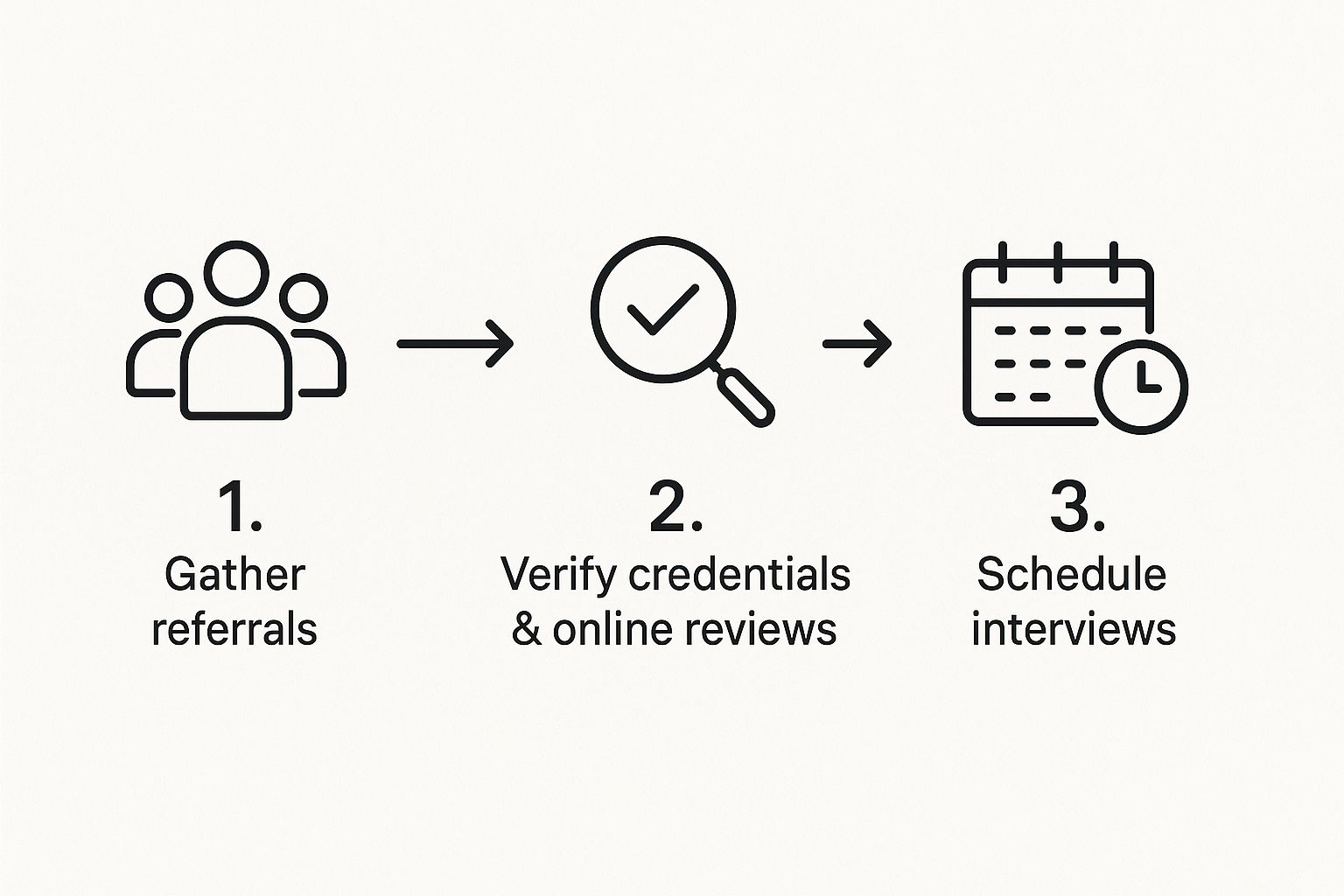Let’s be real: finding a good real estate agent can feel like a high-stakes blind date. It’s more than just a quick search; it’s about finding a partner-in-crime, a strategist who can guide you through the chaos of today’s market. The right way to do it involves a mix of smart digital research, trusted personal referrals, and asking the kind of sharp questions that separate the pros from the pretenders.
Why Your Agent Choice Is a Million-Dollar Decision

You’re not just looking for someone with a key and a license. You need a professional who negotiates like a shark, spots market pitfalls from a mile away, and keeps you sane when things inevitably get weird. This person is your financial co-pilot for one of the biggest transactions of your life. Choosing the wrong one is like hiring a clown for brain surgery. No thanks.
A top-tier agent doesn’t just open doors; they kick them down. They strategize. Their guidance has a direct, measurable impact on your bottom line, whether you’re a first-time buyer sweating the down payment or selling a property you’ve owned for decades.
The Impact of a Great Agent
The difference between a mediocre agent and a great one can literally mean tens of thousands of dollars in your pocket. An experienced pro brings so much more to the table than just access to the MLS.
They offer:
- Sharp Negotiation Skills: The ability to hammer out a better price or secure terms you couldn’t dream of getting on your own.
- Hyper-Local Knowledge: Real insights into neighborhood trends, off-market deals, and pricing quirks that algorithms always miss. This is about knowing the vibe, not just the stats.
- Strategic Problem-Solving: A gut instinct for killing problems with inspections, appraisals, and financing before they have a chance to kill your deal.
This isn’t just talk. The real estate industry has an absolutely brutal 87% dropout rate for new agents within their first five years. That number tells you everything you need to know about how tough this business is and why you need someone with proven staying power.
The right agent is a long-term asset, not a one-time service. They become a trusted advisor you can call for market insights or professional recommendations years after the ink has dried.
Ultimately, knowing how to find a good agent is the foundation for a transaction that’s smooth, profitable, and successful. It’s a skill, one that our own brokers have honed over years in the trenches. You can see what that journey looks like by reading about what we’ve learned after 14 years of teaching ourselves to be a broker.
Start Your Search with Smart Online Sleuthing

Before you pick up the phone, it’s time to put on your detective hat. The internet is where you’ll build your initial shortlist of agents, letting you vet candidates from the comfort of your couch. This is the crucial first cut—the part where you separate the real pros from the wannabes.
Your first stop should be online reviews, but don’t just glance at the star ratings. You need to dig into the actual comments. What you’re looking for are patterns. Is an agent consistently praised for their communication, negotiation chops, or deep local knowledge? Vague, one-line reviews are easy to fake; detailed stories about how an agent navigated a nightmare inspection are pure gold.
Separating Signal from Noise
It’s not just about finding positive reviews; it’s about spotting authentic feedback. You have to pay close attention to reviews that mention specific challenges or unique situations.
- Green Flag: A buyer details how their agent structured a winning offer in a fierce bidding war, outlining the exact strategy that sealed the deal.
- Red Flag: A bunch of five-star reviews are all posted on the same day with generic praise like “Great agent!” or “Highly recommend.” That’s a huge warning sign.
- Green Flag: A seller explains how their agent’s staging advice and professional photography led to offers way over the asking price.
This level of detail points to a genuine experience. It also gives you a real glimpse into an agent’s working style and how they solve problems before you ever speak to them.
Verify Credentials and Digital Footprints
Once you have a few names, it’s time for a quick background check. Every state has a licensing board where you can verify an agent’s credentials and look for any disciplinary actions. A clean record is non-negotiable.
Next, dive into their digital presence. A modern agent’s website and social media profiles are a direct reflection of their marketing savvy. An outdated website or a ghost town of a social media page is a bad sign—it shows they aren’t fully engaged in today’s market. A strong digital footprint proves they understand how to market properties, which is exactly what you need when you’re selling.
An agent’s online presence is their digital storefront. If it’s messy, outdated, or uninviting, how are they going to represent your home to the world? Their marketing for themselves is a preview of their marketing for you.
For a masterclass in what a distinctive real estate marketing approach looks like, check out how our founder, Courtney Poulos, built ACME’s brand from the ground up: https://acme-re.com/2025/03/keycrew-journal-how-courtney-poulos-built-acme-real-estates-distinctive-marketing-approach/. This gives you a benchmark for what to look for in an agent’s own strategy.
By the end of this process, you should have a solid shortlist of three to five agents who have passed the initial sniff test. They’ve got solid reviews, verified credentials, and an online presence that screams professionalism and marketing know-how. Now, you’re ready to move from screens to actual conversations.
Tap Into Your Network for Real Referrals

In a world saturated with online ads and algorithms telling you what you need, nothing cuts through the noise like a real recommendation from someone you actually trust. When it comes to finding a killer real estate agent, your personal network is a goldmine of unfiltered, honest feedback.
This isn’t about getting a name and a number. It’s about getting the real story from people who’ve been in the trenches.
There’s a reason this old-school method still dominates. In 2023, a staggering 65% of sellers found their agent through a referral from a friend, neighbor, or family member, or just hired the agent they’d used before. That number tells you everything you need to know about the power of proven performance over a flashy Zillow profile. You can explore more real estate stats yourself, but the takeaway is clear: personal connections are critical.
Ask Smarter Questions
Here’s where most people go wrong. They ask, “Do you know a good agent?” That’s a yes-or-no question that gets you a name, but no real insight.
To get the intel you actually need, you have to dig deeper. You’re not just looking for a name; you’re looking for a match for your personality and your deal.
Try asking questions that force people to recall specific experiences:
- “How did your agent handle that unexpected inspection issue we talked about?”
- “What was their communication like when things got stressful during negotiations?”
- “Did you ever feel pressured, or did they genuinely listen to what you wanted?”
- “What’s the one thing you wish your agent had done differently?”
These questions pull out the stories. They give you a much clearer picture of an agent’s real-world strengths and weaknesses. It’s the difference between a generic five-star review and a detailed account of how an agent saved a deal from falling apart at the 11th hour.
A referral isn’t just a contact; it’s a story. Listen for details about problem-solving, communication under pressure, and negotiation savvy. These are the traits that define a top-tier agent.
Who to Ask for the Best Referrals
Don’t just limit your search to your close friends. Think about who in your network has recently bought or sold, or who works in fields that touch real estate every single day. Each perspective is valuable.
Here’s who you should be talking to:
- Recent Home Buyers and Sellers: Their experience is fresh. They know the current market and can give you a timely review of their agent’s performance.
- Your Mortgage Lender or Financial Advisor: These pros work with agents daily. They know who is organized, professional, and consistently gets deals to the closing table without drama.
- Local Contractors or Tradespeople: Plumbers, electricians, and inspectors see it all. They know which agents are deeply connected in the community and have a real understanding of a property’s quality (or lack thereof).
- Coworkers in Your Target Area: They can often point you to agents who are true specialists in the specific neighborhoods you’re considering.
By tapping into these different sources, you’ll start to see a few names pop up again and again. This is how you build a pre-vetted list of candidates with a proven track record, long before you ever pick up the phone. Word-of-mouth validation is still the most reliable way to start your search.
Interview Agents Like a Pro
You’ve done the digital deep dive and tapped your network for solid leads. Now comes the main event—the interview.
This isn’t just a casual chat over coffee. This is a job interview, and you’re the one doing the hiring. Your goal is to cut through the smooth sales pitch and get to the core of their actual competence. You’re looking for a partner for one of the most stressful, high-stakes transactions of your life. Their personality, communication style, and strategic mind have to click with yours.
The process to get here is pretty straightforward. You gather referrals, vet them online, and then set up the interviews.

The interview is your final filter, ensuring you only spend your valuable time with pre-qualified candidates who have already passed the initial tests.
Ask Questions That Reveal True Expertise
Anyone can say they’re a great negotiator or a neighborhood expert. A real pro can prove it with stories and data. It’s your job to ask the kind of questions that force them to move beyond canned answers.
Don’t be shy. The quality of your questions will absolutely determine the quality of your choice.
Here are a few sharp, insightful questions designed to reveal what you actually need to know:
- “Walk me through a recent, complicated deal you closed in my target neighborhood. What was the biggest challenge, and how did you solve it?” This question tests their problem-solving chops and local experience in one go. A great agent will have a story locked and loaded.
- “How will you communicate with me? What’s your policy on responding to calls, texts, or emails after hours?” This sets crystal-clear expectations from the start. Look for a specific process, not a vague promise to “always be available.”
- “If my home isn’t getting offers (or my offers keep getting rejected), what’s your Plan B and Plan C?” This uncovers their strategic depth. The best agents are always thinking two steps ahead and don’t just rely on a single, cookie-cutter strategy.
To make this easier, I’ve put together a quick checklist of questions to bring with you. Think of it as your road map for the conversation.
Agent Interview Question Checklist
Use this table to guide your interviews. The goal isn’t just to get an answer, but to understand the thinking and experience behind the answer.
| Question Category | Sample Question | What to Listen For |
|---|---|---|
| Local Market Knowledge | “What makes this specific neighborhood tick? Talk to me about the amenities, the community vibe, and where you see it heading.” | Hyper-local details: the best coffee shop, school district quirks, upcoming zoning changes. Vague answers about “good schools” are a red flag. |
| Strategy & Process | “What’s your pricing strategy for sellers? For buyers, how do you determine a competitive offer?” | A data-driven approach using comps, market absorption rates, and recent trends, not just a gut feeling. |
| Negotiation Skills | “Tell me about a time you had to deliver bad news to a client. How did you handle it?” | A story that shows honesty, problem-solving, and the ability to manage a tough situation without falling apart. |
| Communication Style | “How often will I hear from you, and through what channel? What if there’s no news to report?” | A clear, proactive communication plan. A great agent checks in even when there’s nothing new, just to keep you in the loop. |
| Contingency Planning | “What’s the biggest mistake you see buyers/sellers make in the current market, and how do you help clients avoid it?” | Forward-thinking advice that shows they’ve seen deals go south and know how to prevent it. It demonstrates experience. |
Going in prepared with questions like these changes the entire dynamic. You’re not just a potential client; you’re a savvy consumer looking for a true professional.
How to Read Between the Lines
Listening to how they answer is just as critical as what they say. Are they confident? Do they use hard data and specific examples to back up their claims, or are they leaning on generalizations and fluff?
A top agent sounds like a seasoned consultant, not a desperate salesperson. In fact, they should be interviewing you just as much as you’re interviewing them to make sure it’s a good fit for their business, too.
Pay close attention to their knowledge of your specific area. A true local expert will know the nuances—the street with the drainage problem, the elementary school with the coveted lottery program, or the upcoming commercial development that could impact property values. This is the hyper-local intelligence that separates a good agent from a great one. They should describe neighborhoods based on their character and amenities, not on the people who live there, in line with Fair Housing principles.
Trust your gut. If an agent’s answers feel scripted, evasive, or too good to be true, they probably are. You’re looking for genuine confidence backed by specific, data-driven examples.
This interview is your single best chance to find someone who won’t just get the deal done, but who will be the right partner for you.
Evaluate Their Marketing and Sales Strategy
In today’s market, just sticking a sign in the yard and holding a weekend open house is the real estate equivalent of sending a fax. It’s lazy. If you’re a seller, how an agent markets your home isn’t just a small detail—it’s the whole game. It directly impacts your sale price and how long you’ll sit on the market.
An effective, modern strategy is a full-on assault designed to find and capture every single potential buyer. That means going way beyond a simple MLS listing. You need someone who gets both the art and the science of presentation.
Look for a Visual-First Approach
Buyers fall in love with homes online first. The emotional connection happens through a screen, long before they ever set foot inside. An agent who skimps on visual assets is practically lighting your money on fire.
This part is non-negotiable. A top agent’s marketing plan must include:
- Professional Photography: No blurry iPhone pictures. I’m talking about high-resolution, professionally shot and edited photos that make your home look like it was ripped from a magazine.
- Strategic Drone Imagery: For any property with decent curb appeal, a unique lot, or a great location, drone shots are a must. They provide a killer perspective that you just can’t get from the ground.
- Detailed Floor Plans: These are absolutely crucial. They help buyers visualize the flow and layout of the space, saving everyone a ton of time.
The data on this is crystal clear. Listings with high-quality professional photos sell 32% faster. And homes that include floor plans in the listing can see a 52% jump in online click-throughs. You can see more data on the power of professional real estate marketing on propertybox.io.
Question Their Digital Marketing Chops
Beyond killer visuals, a great agent needs a sophisticated digital game plan. This is where you separate the pros from the amateurs. Ask them to walk you through, step-by-step, how they plan to get your property in front of the right buyers.
Their strategy should include targeted ads on platforms like Instagram and Facebook, aimed at people who fit a specific demographic profile in your area. They also better have a strong email list to blast your listing out to interested buyers and other top agents. It’s not about just getting clicks; it’s about creating a sense of urgency and buzz around your property from day one.
A top agent doesn’t just list your home; they launch it. Their marketing plan should feel like a product release, complete with a pre-launch teaser, a powerful opening weekend, and a clear plan to sustain momentum.
They should also be armed with powerful data. A good agent will use advanced real estate market analysis tools to price your home correctly from the start and pinpoint the ideal buyer profile.
Ask them how they use that data to decide where to spend marketing dollars. An agent who can’t give you a sharp, data-driven answer is just guessing. You can’t afford that when your biggest asset is on the line. Demand a marketing plan that treats it that way.
A Few Last Questions Before You Commit
You’ve done the research, checked the references, and sat through the interviews. You’re almost there. But a few final questions are probably rattling around in your head. It’s smart to have them. Getting straight answers is the final gut check before you sign on the dotted line with an agent.
Let’s cut through the noise and tackle the most common questions people have at this critical point.
Solo Agent or Big Team?
This is a classic dilemma, and honestly, there’s no single “right” answer. It comes down to what fits your personality and needs.
A solo agent offers you one dedicated point of contact. You work directly with them on everything from showings to the final signature. For people who value a highly personal, streamlined relationship, this is often the perfect fit. You know exactly who to call, and they know every single detail of your transaction.
On the other side of the coin, a team brings a whole crew to the table. You might have a showing specialist, a transaction coordinator for paperwork, and the lead agent focused purely on negotiation. The huge advantage here is availability—someone is almost always there to answer a call or show a property.
So, what do you value more? A one-on-one partnership, or the collective power and constant availability of a team?
What Are the Biggest Red Flags I Should Watch Out For?
Spotting red flags early can save you from a world of financial pain and frustration. Some are loud and obvious, but others are more subtle—and just as dangerous.
Here are the warning signs you absolutely cannot afford to ignore:
- They’re a Part-Timer: Real estate isn’t a weekend hobby. You need a full-time professional who lives and breathes the market every single day, not someone squeezing you in between their 9-to-5.
- They Use High-Pressure Tactics: A great agent advises; a bad one pushes. If you ever feel rushed to make an offer you’re unsure about, or pressured to accept a deal that doesn’t feel right, that’s your cue to walk away. Fast.
- They’re a “Yes” Person: An agent who just nods and agrees with everything you say, especially on your home’s potential price, isn’t on your side. You need an expert who provides honest, data-backed advice, even when it’s not what you want to hear.
The most dangerous red flag of all? An agent who suggests a wildly inflated list price just to get your business. This tactic is called “buying the listing,” and it almost always ends with multiple price drops and a longer, more agonizing sale.
How Important Is Hyper-Local Neighborhood Expertise, Really?
It’s not just important—it’s everything. All real estate is local, but the real value is hyper-local. An agent with deep, boots-on-the-ground knowledge of your specific neighborhood has an advantage that Zillow will never, ever have.
A true local pro knows the nuances the data can’t show you. They can tell you about the vibe of a community, the quality of its amenities like parks and transit, the real reputation of the local schools (not just the online ratings), and the inside scoop on zoning changes that could impact property values.
Even better, they have tight relationships with other local agents, which often gives you an inside track on off-market deals and a smoother negotiation process.
Is It Really Okay to Interview Multiple Agents?
Not only is it okay—it’s non-negotiable. You should interview at least three agents before you even think about signing a representation agreement. This is a major business partnership, and you have to be absolutely sure you’ve found the right person for the job.
Each interview gives you a different perspective on marketing strategy, communication style, and their read on the market. It lets you compare their approaches and see who truly gets what you’re trying to accomplish.
Treat it like you’re hiring a key executive for your company. Because that’s exactly what you’re doing.
Finding the right agent is the single most important decision you’ll make in your real estate journey. At ACME Real Estate, our entire team is built on a foundation of hyper-local expertise, data-driven strategy, and an absolute commitment to our clients’ success. If you’re ready to partner with a professional who will fight for you every step of the way, let’s talk. Start your Los Angeles real estate journey with a team you can trust by visiting us at https://www.acme-re.com.
